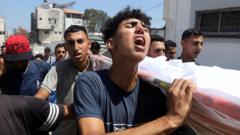In a recent address, Iranian Supreme Leader Ayatollah Ali Khamenei contended that US airstrikes on Iran’s nuclear sites were ineffective, asserting that the nuclear program remains intact and threatening further strikes on US facilities in the region.
Khamenei Claims US Strikes Fail to Impede Iran's Nuclear Ambitions

Khamenei Claims US Strikes Fail to Impede Iran's Nuclear Ambitions
Iran's Supreme Leader dismisses US claims of success after airstrikes, asserting Iran’s resilience and warning of potential retaliation.
Iran's Supreme Leader Ayatollah Ali Khamenei has declared that the United States gained "no achievements" from its recent airstrikes aimed at disrupting Iran's nuclear program, marking his first public statement following a ceasefire agreement with Israel. Khamenei stated that these strikes failed to significantly impact Iran's nuclear ambitions and emphasized that the American-led retaliation against an airbase in Qatar dealt a "heavy blow."
These comments emerged as US officials maintained that the strikes critically set back Iran's nuclear capabilities. US Defense Secretary Pete Hegseth asserted that intelligence from both the US and Israel indicated a destruction of crucial aspects of Iran's nuclear infrastructure. President Donald Trump echoed this sentiment, proclaiming that key nuclear sites had been "totally obliterated" and expressing frustration at reports suggesting less damage than expected.
Khamenei, who had limited his public appearances since direct conflict with Israel escalated, appeared in a televised address, threatening future strikes against US bases should further attacks occur. He criticized Trump for overstating the strikes' effectiveness, asserting that they did not achieve their intended objectives. He stressed, “The cost for the aggressor will undoubtedly be very high,” referencing the US airbase assault.
The ongoing tension was ignited after Israeli Prime Minister Benjamin Netanyahu's warnings that Iran could rapidly produce a nuclear weapon. Though Iranian officials assert that their nuclear endeavors are strictly for civilian uses, the International Atomic Energy Agency recently declared Iran in breach of its non-proliferation obligations for the first time in two decades.
In response to the escalating situation, Iran's parliament has moved to cease cooperation with the IAEA, which would allow Israel greater freedom in its military operations. The US became embroiled in the conflict after striking key sites in Fordo, Natanz, and Isfahan, and President Trump quickly sought to mediate a ceasefire, despite shaky compliance from both sides amid intermittent missile strikes.
As speculation grows about Khamenei's safety and motivations, both the US and Iran continue to posture for influence in an increasingly volatile Middle Eastern landscape, leaving global observers anxiously monitoring the next steps in this high-stakes standoff.





















